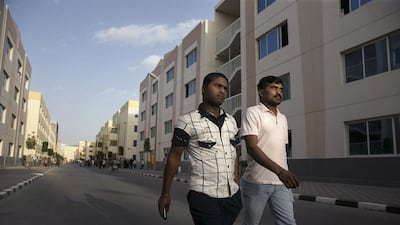ABU DHABI // The quality of workers’ accommodation in Abu Dhabi has vastly improved, say those living in them.
Dining, health, hygiene and sanitation have been upgraded at the Industrial City Abu Dhabi, and residents say they can hardly fault the centre.
In years gone by, labourers in the Icad camp in Mussaffah complained about food and hygiene.
“All facilities are good inside the camp and more, including a movie theatre and markets, are being constructed inside the Icad,” says Yaqoob Ali, a Bangladeshi resident who shares a dormitory with 10 others at Icad.
“Of late, I don’t find any need for new improvements inside the camp. Already all things are in place and new facilities are regularly being added.”
Residents at Al Mafraq Workers City 1 and 2 in Al Mafraq and Workers Village in Mussaffah say that while the camps had shown improvement in overall facilities, some still needed to improve the quality of food.
But those living in Icad have no complaints.
The centre houses about 26,000 people and was built four years ago as a “superior destination” for workers in Abu Dhabi.
It features supermarkets, public transport, money-exchange houses, restaurants, parks and vending machines. A cinema is under construction.
_____________________________________________________________
Read part one of the series: A look inside UAE labour accommodation living conditions
_____________________________________________________________
“Everything is good now and we are having no problem in the camp,” says electrician Mukhlis Mian, another Bangladeshi.
“In the evening we sit in the park, which is beautifully maintained. It’s a good place to unwind and we regularly go there.”
Earlier complaints by residents about the quality of food seemed to have been addressed.
“Food quality is good and I eat at the mess,” Mr Mian says.
Pakistani Ashfaq Ahmed says: “I have lived here for five years and also eat inside the camp, but I don’t have any problem.
“Before, there was some issues of improper food preparation inside the camp, like the bread wasn’t cooked properly. But now facilities have been upgraded, and I don’t hear anything from others either.”
The state news agency Wam reported in 2013 that Abu Dhabi had invested about Dh20 billion in 23 workers’ “cities”, which could house 385,000 people.
The Higher Corporation for Specialised Economic Zones (ZonesCorp) website says: “Within just 10 years, ZonesCorp has helped to shape Abu Dhabi’s industrial landscape through the development of six world-class, fully integrated industrial zones.”
The six zones are Icad 1, 2 and 3, Al Ain Industrial Cities 1 and 2, and Workers’ Residential Cities – all of which are in Abu Dhabi.
Zones planned include Icad 4, on the west side of Mussaffah industrial city, and Icad 5, at an unannounced location.
One Icad resident, Indian steel fixer Shakeer Ali, says there are plenty of facilities but it is expensive to live there.
Mr Ali says that goods and services inside the labour camps should be subsidised so that all workers can afford them.
He says tea and a 500ml bottle of water in the city cost Dh1 each – the same price as is charged in Icad.
“But those in the city earn Dh5,000 to Dh10,000 a month, while workers earn Dh600 to Dh1,000 a month,” Mr Ali says.
He says the exchange houses inside the camp do not give the best rates and workers generally go to the city to transfer money.
These things should be monitored to further improve services if authorities want to support workers, he says.
ZonesCorp and the Ministry of Labour did not comment.
_____________________________________________________________
More coverage on this topic:
■ Expat workers' sacrifice for life outside UAE labour camps
■ Despite difficult conditions, labourers feel better of in UAE
■ Purchasing power: strong dirham helps South Asian expats back home
More from 22 March:
■ Special report: A look inside UAE labour accommodation living conditions
■ Life on Saadiyat: catering staff try to please different palates
■ Passport retention by UAE companies less common
_____________________________________________________________
About this package:
The UAE has signed up to nine International Labour Organisation conventions to protect workers’ rights, and in 2006 was the first country in the region to enact a comprehensive anti-human trafficking law. These conventions spurred the Tourism Development & Investment Company (TDIC) to improve the quality of life for 7,000 employees living in workers villages on Saadiyat island. While most workers say they are satisfied with life in Saadiyat Accommodation Village, many have voiced concern about the poor taste of the food. Despite criticism, the purchasing power of the dirham in Southest Asian countries remains a major factor in attracting expatriates to the UAE. Similarly, concerns over passport retention have decreased as the practice has become less common in the UAE.
anwar@thenational.ae

